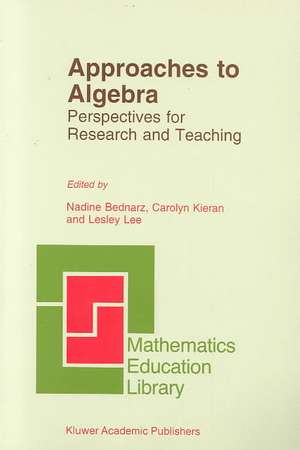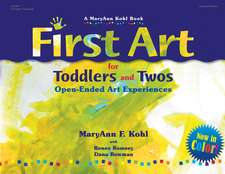Approaches to Algebra: Perspectives for Research and Teaching: Mathematics Education Library, cartea 18
Editat de N. Bednarz, C. Kieran, L. Leeen Limba Engleză Paperback – 30 iun 1996
| Toate formatele și edițiile | Preț | Express |
|---|---|---|
| Paperback (1) | 1445.40 lei 38-44 zile | |
| SPRINGER NETHERLANDS – 30 iun 1996 | 1445.40 lei 38-44 zile | |
| Hardback (1) | 1662.07 lei 6-8 săpt. | |
| SPRINGER NETHERLANDS – 30 iun 1996 | 1662.07 lei 6-8 săpt. |
Din seria Mathematics Education Library
-
 Preț: 389.70 lei
Preț: 389.70 lei - 15%
 Preț: 645.96 lei
Preț: 645.96 lei - 18%
 Preț: 742.97 lei
Preț: 742.97 lei - 18%
 Preț: 1394.84 lei
Preț: 1394.84 lei - 18%
 Preț: 947.50 lei
Preț: 947.50 lei - 18%
 Preț: 1544.80 lei
Preț: 1544.80 lei - 15%
 Preț: 652.49 lei
Preț: 652.49 lei - 18%
 Preț: 1385.67 lei
Preț: 1385.67 lei - 18%
 Preț: 1225.48 lei
Preț: 1225.48 lei - 15%
 Preț: 643.34 lei
Preț: 643.34 lei - 18%
 Preț: 1221.07 lei
Preț: 1221.07 lei - 18%
 Preț: 952.89 lei
Preț: 952.89 lei - 18%
 Preț: 950.52 lei
Preț: 950.52 lei - 18%
 Preț: 1224.54 lei
Preț: 1224.54 lei - 15%
 Preț: 651.19 lei
Preț: 651.19 lei -
 Preț: 391.61 lei
Preț: 391.61 lei - 18%
 Preț: 948.16 lei
Preț: 948.16 lei - 18%
 Preț: 944.19 lei
Preț: 944.19 lei - 18%
 Preț: 1380.95 lei
Preț: 1380.95 lei - 18%
 Preț: 947.85 lei
Preț: 947.85 lei - 18%
 Preț: 948.61 lei
Preț: 948.61 lei - 15%
 Preț: 635.31 lei
Preț: 635.31 lei - 15%
 Preț: 644.63 lei
Preț: 644.63 lei - 15%
 Preț: 646.43 lei
Preț: 646.43 lei - 15%
 Preț: 647.59 lei
Preț: 647.59 lei
Preț: 1445.40 lei
Preț vechi: 1901.84 lei
-24% Nou
Puncte Express: 2168
Preț estimativ în valută:
276.60€ • 287.03$ • 231.20£
276.60€ • 287.03$ • 231.20£
Carte tipărită la comandă
Livrare economică 11-17 martie
Preluare comenzi: 021 569.72.76
Specificații
ISBN-13: 9780792341680
ISBN-10: 0792341686
Pagini: 368
Ilustrații: XVI, 348 p.
Dimensiuni: 155 x 235 x 19 mm
Greutate: 0.51 kg
Ediția:1996
Editura: SPRINGER NETHERLANDS
Colecția Springer
Seria Mathematics Education Library
Locul publicării:Dordrecht, Netherlands
ISBN-10: 0792341686
Pagini: 368
Ilustrații: XVI, 348 p.
Dimensiuni: 155 x 235 x 19 mm
Greutate: 0.51 kg
Ediția:1996
Editura: SPRINGER NETHERLANDS
Colecția Springer
Seria Mathematics Education Library
Locul publicării:Dordrecht, Netherlands
Public țintă
ResearchCuprins
1. Approaches to Algebra: Perspectives for Research and Teaching.- I. Historical Perspectives in the Development of Algebra.- 2. From Euclid to Descartes: Algebra and its Relation to Geometry.- 3. The Roles of Geometry and Arithmetic in the Development of Algebra: Historical Remarks from a Didactic Perspective.- 4. The Role of Problems and Problem Solving in the Development of Algebra.- II. A Generalization Perspective on the Introduction of Algebra.- 5. Expressing Generality and Roots of Algebra.- 6. An Initiation into Algebraic Culture through Generalization Activities.- 7. Some Reflections on Teaching Algebra through Generalization.- III. A Problem-Solving Perspective on the Introduction of Algebra.- 8. Emergence and Development of Algebra as a Problem-Solving Tool: Continuities and Discontinuities with Arithmetic.- 9. Developing Algebraic Aspects of Problem Solving within a Spreadsheet Environment.- 10. Rough or Smooth? The Transition from Arithmetic to Algebra in Problem Solving.- 11. Algebraic thought and the Role of a Manipulable Symbolic Language.- 12. Placement and Function of Problems in Algebraic Treatises from Diophantus to Viète.- 13. Problem-Solving Approaches to Algebra: Two Aspects.- 14. “When is a Problem?”: Questions from History and Classroom Practice in Algebra.- IV. A Modeling Perspective on the Introduction of Algebra.- 15. Mathematical Narratives, Modeling, and Algebra.- 16. Reflections on Mathematical Modeling and the Redefinition of Algebraic Thinking.- 17. Modeling and the Initiation into Algebra.- V. A Functional Perspective on the Introduction of Algebra.- 18. A Technology-Intensive Functional Approach to the Emergence of Algebraic Thinking.- 19. Introducing Algebra by Means of a Technology-Supported, Functional Approach.- 20. AFunctional Approach to Algebra: Two Issues that Emerge.- VI. Synthesis and Directions for Future Research.- 21. Backwards and Forwards: Reflections on Different Approaches to Algebra.- References.- Author Affiliations.






